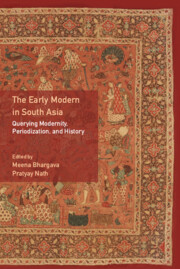10 - Law, Empire, and the New Julfan Armenians: The Early Modern in the Indian Ocean World
Published online by Cambridge University Press: 06 September 2022
Summary
The category of the early modern for the period between the fifteenth and nineteenth centuries has worked as a crucial tool to reclaim pre-colonial South Asian history from the elusive gap between the medieval – a product of Eurocentrism – and the modern, which is conventionally associated with the advent of European colonialism. This chapter intends to navigate this divide and revisit the utility of the category for this phase of South Asian history by analysing what distinguished this period from the nineteenth century in terms of historical tendencies. It intends to do so by looking at the period through the lens of the New Julfan Armenian diaspora and their agency in the shaping of the legal culture of the eighteenth century.
In his pioneering work, John Richards lists six major processes that characterized early modernity. The rise of the global oceanic routes and circulation across long distances was one of these processes. This was facilitated by the formation of networks like that of the New Julfan Armenians. Reviewing the era through the eyes of stateless, transoceanic, and cross-cultural actors like the Armenians is useful in understanding the idea of the global connectivity and cross-cultural exchange that developed during this period.
The chapter is divided into three main sections. The first looks at the customary legal culture of the New Julfans and how that became the basis of both their diasporic culture and activities. The second section looks at the impact of the early colonial legal regime on the maritime trade that became a crucial area of Anglo-Armenian interaction. Building upon this idea of interaction, the third section looks more specifically at their experience and dialogue with the Mayor's Court of Madras. I argue that the early colonial regime that had evolved by the end of the eighteenth century was a product of the deliberations between the colonial state and the various indigenous elements that emerged in the period from the fifteenth to the eighteenth centuries. In course of the nineteenth century, however, the flexibility of this early colonial regime was transformed into a state of much more stringent colonial authority.
New Julfans and Their Legal Culture
The New Julfan Armenian network was formed during the course of the Safavid– Ottoman contests in the seventeenth century.
- Type
- Chapter
- Information
- The Early Modern in South AsiaQuerying Modernity, Periodization, and History, pp. 203 - 223Publisher: Cambridge University PressPrint publication year: 2023



